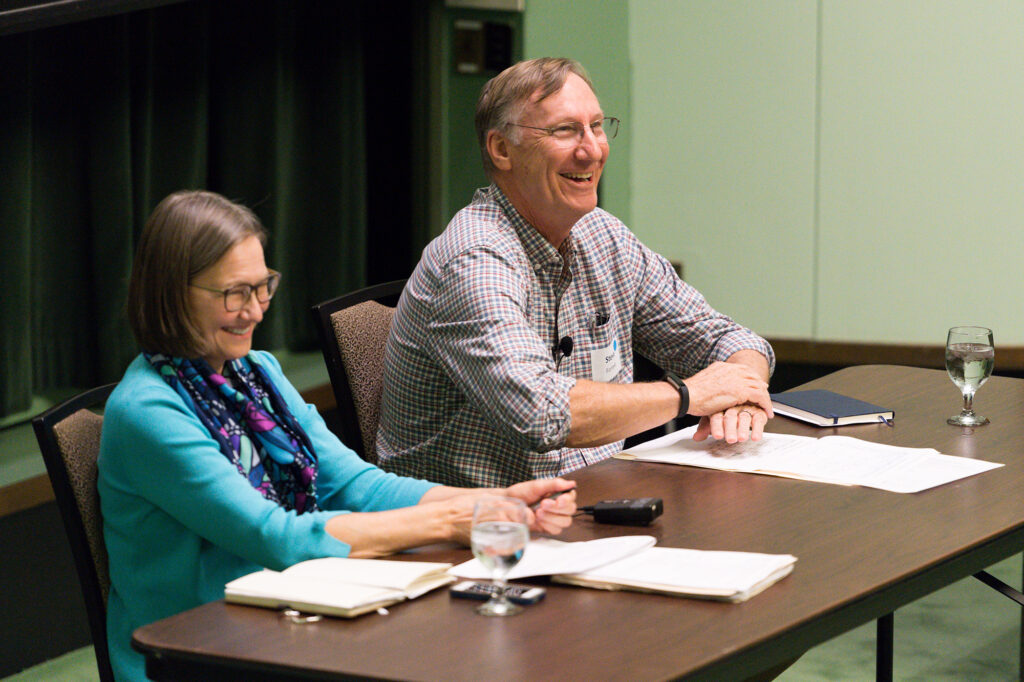Commission co-chairs: Climate change solutions need broad commitment

 Enlarge
Enlarge
Successfully tackling the problem of climate change will require help from all areas of the University of Michigan community, the co-chairs of the President’s Commission on Carbon Neutrality said Sept. 25.
“The challenge is massive, but so is the climate crisis that we’re facing,” Jennifer Haverkamp, commission co-chair and director of the Graham Sustainability Institute, said during a community forum at the Rackham Graduate School.
“There are many dimensions, many stakeholders. It’s complex. This is a long-term effort that we have embarked upon, and we need commitment and engagement from everybody — all segments of the university — to be successful.”
The forum included an update on the commission’s work and opportunities for students, faculty and staff to ask questions and offer feedback. About 100 people attended.
The commission, which is working to set the university on a path to carbon neutrality, has been busy in recent months.
Haverkamp said it is seeking requests for proposals from outside experts for a heat and power infrastructure analysis, which would look at the university’s options to transition away from natural gas.
She also said a group of faculty and staff is examining the possibility of hiring experts to study retrofitting existing buildings for energy efficiency.
Stephen Forrest, co-chair of the commission and professor of electrical engineering and computer science, physics, and material sciences and engineering, said the commission has been working to determine the scope of its recommendations. That process includes carbon accounting, or the measurement of emissions.
Forrest noted there are three types of emissions. Scope 1 emissions are generated on campus by the university, Scope 2 emissions are associated with the university’s purchased electricity, and Scope 3 emissions come from entities that are not owned or directly controlled by the university. The last group is the most difficult to quantify.
To help measure emissions, the commission collected data about the size of university buildings. The university leases and owns about 42,746,000 square feet, Forrest said, adding President Mark Schlissel has given the commission latitude when it comes to making decisions about the geographic and topical scope of its work.
“We’re taking this very seriously and comprehensively,” Forrest said.
During the forum, Haverkamp also noted that:
• U-M recently joined 20 other North American universities in the University Climate Change Coalition.
• The commission created eight internal analysis teams to examine the topics of building standards, energy consumption, commuting, university travel, food, bio sequestration, campus culture and communication, and external collaboration.
Moderators asked questions that were submitted by audience members. One person asked how the commission intends to incorporate justice and equity into its recommendations.
“The charge that we have given to each of these analysis teams is to include consideration of justice issues as they do their research and develop their recommendations to us,” Haverkamp said. “That includes also reaching out to communities that are underrepresented, usually, in these conversations.”
After the co-chairs’ presentation in the Rackham Amphitheater, attendees moved to a breakout room for focused discussions around each of the eight topics.
Attendee Sarah Kelley, an energy engineer with the Office of Campus Sustainability, said she supports the commission’s goal of carbon neutrality.
“I am particularly interested in the energy conservation (analysis team), because that’s what I do on a daily basis is to decrease energy usage in buildings. I’m really excited to hear about what that group’s plans are,” she said.
Noting that she has a daughter, Kelley said she believes people need to act aggressively in addressing the climate crisis.
“I’m happy to hear that the university is investing in this, and I’m glad to be a part of it,” she said.
The President’s Commission on Carbon Neutrality brings together the university community and regional partners to explore how U-M can reduce its carbon emissions to environmentally sustainable levels. Commission members will develop recommendations for the president. They also hope to create scalable strategies that other institutions can use to achieve the same goal.
The commission will release an interim progress report later this year followed by a second interim report in the spring. Final recommendations are expected in fall 2020.
This story originally appeared in The University Record